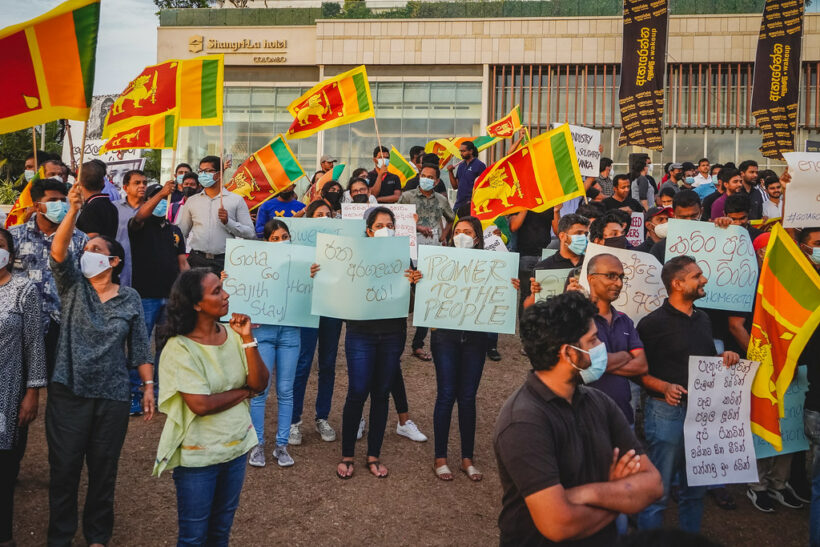On August 20th, there was another major protest in Colombo, Sri Lanka. The protests persisted even after the president fled the country and a new president was appointed.
The protests started in March and are still ongoing.
In March 2022, protests started in Sri Lanka against the government due to the economic crisis that the country has been suffering. Since the election of Gotabaya Rajapaksa as president in 2019, Sri Lanka has experienced an unprecedented economic crisis, characterised by high inflation rates, limited access to food and medical supplies as well as severe shortages of fuel, cooking gas, and electricity as a result of years of corruption by Sri Lanka’s former presidents who appointed their family members in leadership positions and increased their powers. The situation has also worsened due to COVID-19 since the country’s economy is mainly based on tourism.
The Rajapaksas have ruled Sri Lanka for several years now during which the country did enjoy some economic growth. However, this was accompanied by an unprecedented increase in the national debt. When COVID-19 hit, the situation only got worse. Mismanagement has resulted in political and economic unrest, leading the country now to the verge of bankruptcy and the people revolting against the president.
Rajapaksa flees
The protests were apparently successful when the former president fled the country and announced his resignation the following day. A few days later, Ranil Wickremesinghe, who became prime minister after Mahinda Rajapaksa’s [Gotabaya’s brother] forced resignation, was elected as president by parliament and is due to continue with Rajapaksa’s presidential term until 2024.
Nevertheless, the protests persisted as people did not want to accept him as president stating that “he’s not our president” as emphasised by the leader of the Inter University Student Federation when speaking to the crowd. One of the protesters also affirmed that the protests will continue until “there is freedom from corrupt leaders,” as reported by The Guardian.
In spite of the fact that the protests were peaceful, Wickremesinghe used violence against them when he announced that the country was under a state of emergency and activated the “Prevention of Terrorism Act (PTA)”.
On August 18th and August 19th, hundreds of people joined protests and several of them were detained by the police. This led to the eruption of yet another protest that started on August 20th to demand the abolition of the use of the PTA law against protesters.
Protesters demand political and economic reforms
Even though the previous president fled the country, the situation did not seem to get any better. Food prices went up, fuel became even scarcer, and more issues arose as a result of the general political instability in the country.
Before the resignation of the previous president, Al Jazeera reported that the people’s demands were the following:
- Resignation of Rajapaksa
- Resignation of Wickremesinghe and his government
- A new constitution to be approved through a referendum
- Reducing the president’s powers
- Creating an interim government that works to fulfil these demands
Since these demands were not met, Sri Lankans were determined to continue their fight. Even though the protesters called for the resignation of Wickremesinghe from the government, parliament still elected him as president. This rendered the protesters more furious and willing to continue their rallies.
The protesters want to ensure that a new constitution is to be implemented and ratified by a referendum. The protesters shed light on some of the points to be included in the new constitution. These include: the recognition of the right to life as a fundamental right; fair elections to be held under a fair process; a law to allow the people to recall the elected representatives; the right to education and health; and the right to call for a referendum.
Civil society organisations have supported the movement and posted a statement condemning the new president’s violence against the protesters and highlighted the people’s constitutional right to protest and, as they say, “to advocate for change”.
Uncertainty ahead
The country is now seeking a bailout from the International Monetary Fund (IMF) due to the deteriorating economic situation which is the worst since independence. The process towards that began with an expected visit from the IMF from August 24th to September 1st which issued a statement supporting the government in its preparation for economic recovery.
Nevertheless, the economic crisis continues to deteriorate, and people have lost all trust in the government. Sri Lankans are demanding new elections but parliament has decided that Wickremesinghe will remain acting president until the end of the previous president’s term in 2024. This decision will not satisfy the protesters. Thus, the future for Sri Lankans remains very uncertain.










